
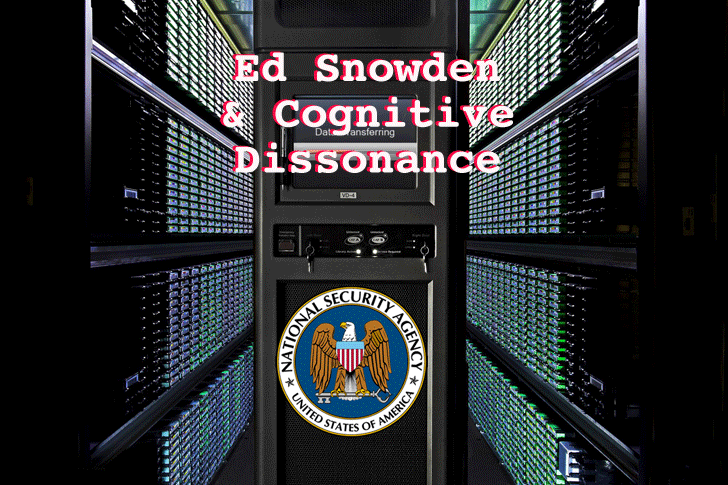
by Geraldo Fuentes
But first...
As an update to the following story, on August 1, 2013, Ed Snowden was granted asylum in Russia for one year. Hopefully this will allow him to relocate to one of the South American countries that had offered him asylum in July.
There have been a number of false rumors surrounding the information that Snowden is releasing, mainly through pre-arranged revelations by the reporter for The Guardian who broke the story. One in particular claims that Snowden revealed the government's worry that a "kill shot" from the Sun will hit earth in September. This revelation supposedly comes from a team of US Remote Viewers.
The story is easily proven false with a minimum of research, but somehow it has taken off. We remember that the RV team did predict a solar event of catastrophic proportions for May-June 2013, but then nothing happened. They were 100% wrong and remote viewing took a fatal hit in credibility.
This was an attempt to revive an interest in remote viewing and, specifically, in a company that continues to offer courses in the phenomenon whereby one can "see" the future.
In short: don't worry about it. It is a complete fake. Whew!
Now back to the story...
I recently read a post by a member of the NSA who, anonymously, described the predicament that faced Edward Snowden. I think it best describes the unusual (well, maybe not that unusual) predicament that Snowden found himself in. It's what psychologists call cognitive dissonance, when one is presented with two opposing thoughts at the same time.
Snowden, you will remember, revealed to the world that the National Security Agency had been collecting and storing personal e-mails, phone calls and other communications of American citizens, in violation of the agency's mandate to focus on foreign threats.
Ed Snowden's announcement, together with undisclosed data files that back up his assertions, came just weeks after a similar disclosure was published in a WIRED magazine article. This WIRED article suggested that domestic spying was being done on a scale larger then we knew and prompted a Senate hearing in Washington DC in March 2013.
In the following video you will see Congressman Hank Johnson (D-Georgia) questioning NSA director and CYBERCOM commander General Keith Alexander at this Senate hearing regarding reports that the NSA is intercepting U.S. citizens' phone calls and e-mails, as reported in the WIRED story.
Count the number of times General Alexander is asked directly about domestic surveillance and then denies that it is part of the NSA's interest or capability. These lies to the American people were made under an oath to "tell the truth".
It is easy to see which oath took priority with General Alexander. The oath to defend the Constitution, as well as to tell the truth, lost big time.
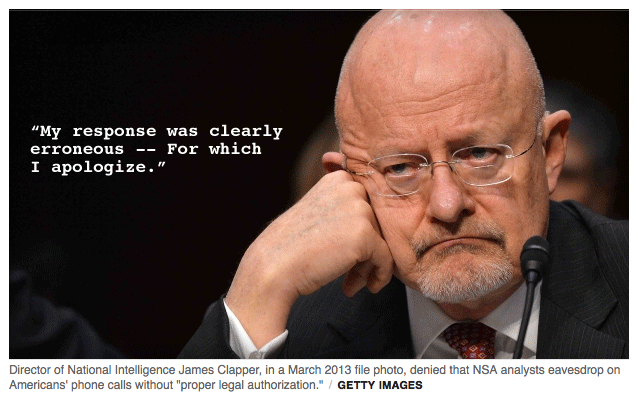
National Intelligence Director James Clapper [above] also lied at the same hearing. After Snowden's revelations, he apologized for telling Congress the National Security Agency does not collect data on millions of Americans.
Clapper was asked during a hearing by Sen. Ron Wyden, an Oregon Democrat on the Intelligence Committee, if the NSA gathered "any type of data at all on millions or hundreds of millions of Americans."
At first, Clapper answered definitively: "No." Pressed by Wyden, Clapper changed his answer. "Not wittingly," he said. "There are cases where they could inadvertently perhaps collect, but not wittingly." -- All of this was a lie.
Conflicting Oaths
Getting back to Ed Snowden, it is interesting to look at the two oaths that he took: The National Security Oath and the oath to "Defend the Constitution of the United State from foreign and domestic threats."
|
NSA Security Oath
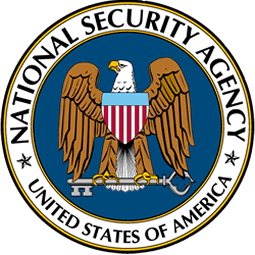 Upon being cleared to protect the sensitive information of the National
Security Agency, I subscribe to this oath freely, without mental
reservation, and with the full intent to exercise meticulous care
in abiding by its items.
Upon being cleared to protect the sensitive information of the National
Security Agency, I subscribe to this oath freely, without mental
reservation, and with the full intent to exercise meticulous care
in abiding by its items.
I solemnly swear that I will not reveal to any person any information pertaining to the classified activities of the National Security Agency, except as necessary toward the proper performance of my duties or as specifically authorized by a duly responsible superior known to me to be authorized to receive this information. I further solemnly swear that I will report without delay to my security representative the details and circumstances of any case which comes within my knowledge of an unauthorized person obtaining or attempting to obtain information concerning the classified operations of the National Security Agency. I fully appreciate and understand that the security of the information and activities of the National Security Agency is of vital importance to the welfare and defense of the United States. I affirm that I am familiar with the provisions of Sections 793, 794 and 798, Title 18, United States Code. I do hereby affirm any understanding that the obligations of this oath will continue even after severance of my connections with the National Security Agency and that they remain fully binding on me during peacetime as well as during wartime. [emphasis added] |
The National Security Oath is one of two relevant oaths to which Ed Snowden had to swear in order to perform his work as a system administrator with the NSA sub-contractor, BOOZ ALLEN, in Hawaii.
As a citizen of the United States, Snowden is also bound by the following Oath of Allegiance:
|
Oath of Allegiance to the United States of America
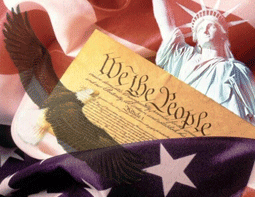 I hereby declare, on oath, that I will support and defend the Constitution and laws of the United States of America against all enemies, foreign and domestic; that I will bear true faith and allegiance to the same; that I will bear arms on behalf of the United States when required by the law; that I will perform noncombatant service in the Armed Forces of the United States when required by the law; that I will perform work of national importance under civilian direction when required by the law; and that I take this obligation freely without any mental reservation or purpose of evasion; so help me God.
I hereby declare, on oath, that I will support and defend the Constitution and laws of the United States of America against all enemies, foreign and domestic; that I will bear true faith and allegiance to the same; that I will bear arms on behalf of the United States when required by the law; that I will perform noncombatant service in the Armed Forces of the United States when required by the law; that I will perform work of national importance under civilian direction when required by the law; and that I take this obligation freely without any mental reservation or purpose of evasion; so help me God.[emphasis added] |
The NSA poster said it well:
Millions of us have sworn to keep the nations secrets "freely and without reservation." Some of us did it during their military service and some did it as a matter of employment. Some of us also swore to "support and defend the Constitution against all enemies, foreign and domestic." I can imagine situations that put those two oaths in conflict.How do you treat the nation's secrets when the government acts in opposition to the Constitution? What do you do when whistle blowers receive retribution, instead of the praise they deserve? What do you do when the immense capability of the national security apparatus is not used to discover foreign enemies, but to punish domestic leaks to the press, leaks that embarrass the administration in power?"
-Robert the Oath Keeper
How it's done...
There are tens of millions of web sites and blogs on the world wide web. Yet, when you use a search engine like google or Bing, you receive all the links containing keywords in less than one second! Sometimes the results appear even before you have finished typing. Often, the web page or blog is not specifically about your keyword, but merely mentions it in the body of the text.
This all happens because of software like Oracle, which can gather and sift through huge quantities of web content, determine the most relevant links and make a report. We have had this computing capability for years.
More sophisticated programs can be used to sort through e-mails, instant messages, skype messages and on-line transactions like those used on e-bay or amazon.com. Your buying and reading habits are all stored and commerce sometimes uses this data to target you for specific ads for products.
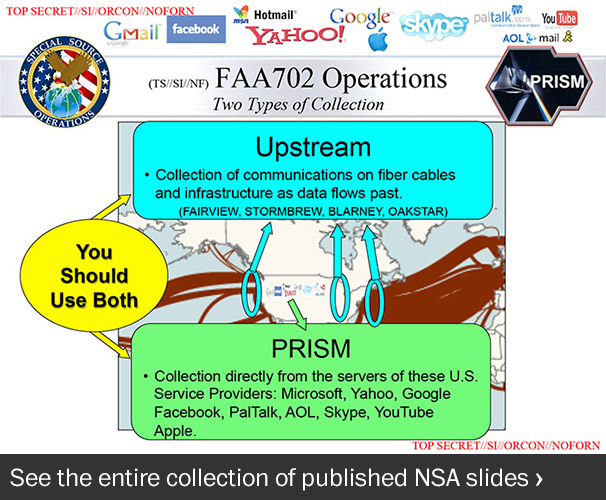
[Above: Powerpoint presentation classified TOP SECRET describes methods used to obtain everyone's private data. This was part of the evidence Snowden collected.]
This kind of personal data has been used, with appropriate warrants, in such cases as the Casey Anthony trial, where it was revealed that she made google searches for chloroform.
But the present concern, raised by Ed Snowden, is that this data is being saved on everyone -- regardless of warrants or even the suspicion of a crime or threat against America. Once it is stored, it is just waiting for you to cross the line by criticizing the government or expressing your contrary views on politics or religion.
If you are in a position of power, this information may be used to blackmail or embarrass you, unless you go with the flow.
To spy on everyone, all of the data passing through the fiber optic cables of the main internet "trunk lines" are gathered and stored. Later, once this data is in memory, "mining" programs can go through it with specific tasks assigned, pulling out personal data from months or years in the past.
In the video of the Senate hearing [above], following the revelations in the WIRED magazine article, General Alexander is asked if it is possible for someone at the NSA to locate all the e-mails that mentioned, for example, Vice-President Cheney's embarrassing hunting accident. Alexander denied that the NSA had this capability in the hearing but later, after Snowden's revelations, he apologized for mis-leading Congressional investigators.
The NSA has the ability to retrieve and store hundreds of terabytes of data a day, every day, at their newly built facility in Bluffdale, Utah. There, the computer power is so great that they have refrigeration units to cool the processors and the wattage used requires its own power station with the capacity to fire up a small town.
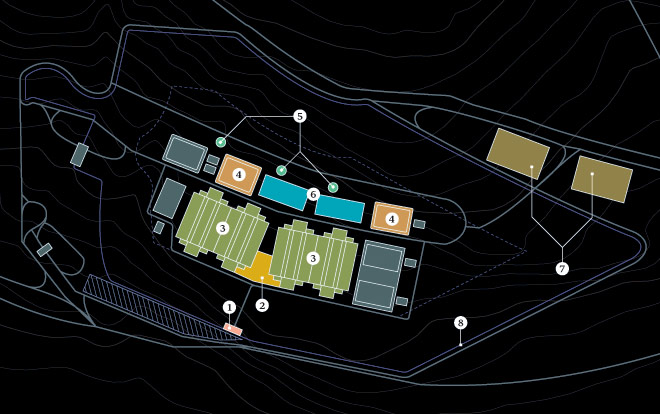
The NSA Date Center in Bluffdale, Utah (Now completed)
1 Visitor control center A $9.7 million facility for ensuring that only cleared personnel gain access.
2 Administration Designated space for technical support and administrative personnel.
3 Data halls Four 25,000-square-foot facilities house rows and rows of servers.
4 Backup generators and fuel tanks Can power the center for at least three days.
5 Water storage and pumping Able to pump 1.7 million gallons of liquid per day.
6 Chiller plant About 60,000 tons of cooling equipment to keep servers from overheating.
7 Power substation An electrical substation to meet the center's estimated 65-megawatt demand.
8 Security Video surveillance, intrusion detection, and other protection will cost more than $10 million.
How it's used...
Imagine if the government wanted to persuade foreign or domestic politicians to see things to their advantage. Imagine that the politician had written private e-mails to a mistress or same sex partner and these were made available to the government. This kind of blackmail has always been used but now, with the data collection of the NSA, it is made much easier.
We have already seen political disasters where US politicians have crash landed because of their on-line revelations. And while most of these involve some kind of sexual mis-adventure, many more secrets of more significance are out there, posing threats not only to individuals but to entire groups.
Your right to privacy is not covered under the Second Amendment, as most people believe it is. Freedom of Speech applies mainly to criticizing the government and isolating religious ideals from government censorship. It is the Fifth Amendment that outlines our right to personal privacy and guards against the use of personal information to incriminate us.
It was the abuse of the Fifth Amendment that Ed Snowden was considering and defending. But defending the Constitution put Snowden in conflict with his oath to protect a particular government agency (the NSA falls under the Department of Defense). Which is more important -- defending the Constitution or allowing the un-Constitutional behavior of the NSA to go unopposed?
General Alexander made his choice when he wrongfully testified at the Senate hearing back in March. He would still be telling the lie if Ed Snowden had not revealed the PRISM program. Alexander decided that the Constitution was less important to him than his oath of secrecy to the NSA.
Too often the cognitive dissonance resolves by taking the path of least resistance. Telling lies for the "secret" government often yields rewards and promotions and seldom does the liar face negative consequences. For Ed Snowden, who is well aware of the consequences, he chose to defend the Constitution -- which benefits all of us ordinary people -- and exposed the un-Constitutional violation of our protected right to privacy.
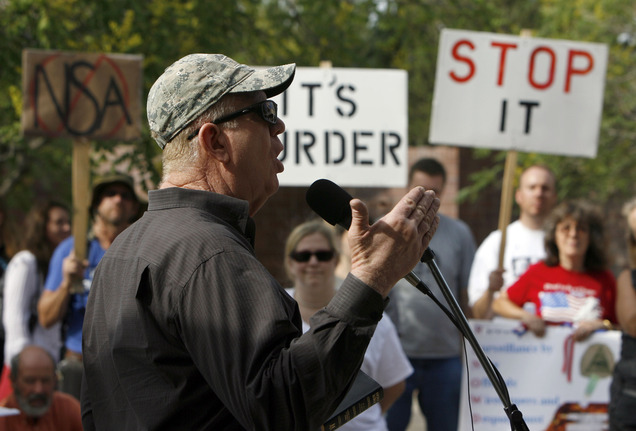
There is a backlash against the NSA evident in many July 4th protests [above picture from protests outside the Utah NSA Data Center] and demonstrations across the nation and in foreign countries. Let's hope it continues and the public's outrage does not get side-tracked by the usual distractions.
